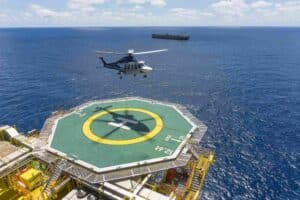
The oil and gas industry is vital in powering the modern world. With their towering structures and complex machinery, oil rigs are integral to extracting valuable resources from deep within the Earth.
However, oil rig operations expose workers to various hazards, resulting in potentially severe accidents. Understanding these risks is crucial for workers and employers to prioritize safety measures and prevent incidents. Here, you can learn about the seven most common oil rig accidents and discuss the importance of protecting workers in the energy industry.
If you are injured in an oil rig accident, our workers’ comp attorneys are here to help. Contact The Burkett Law Firm to learn more about your rights and options.
Slips, Trips, and Falls
One of the most prevalent accidents on oil rigs involves slips, trips, and falls. The combination of slippery surfaces, elevated platforms, and heavy equipment constantly threatens worker safety. The following factors can lead to serious slips, trips, and falls on oil rigs:
Inadequate Lighting
Insufficient lighting on oil rigs increases the risk of slips and falls. Poor visibility can make it difficult for workers to identify hazards or uneven surfaces, leading to accidents. Proper lighting installations and regular maintenance are essential to ensure a well-illuminated work environment, reducing the chances of accidents caused by inadequate lighting.
Improper Safety Protocols
When safety protocols are not followed or are poorly implemented, the risk of slips and falls rises significantly. Failure to enforce procedures such as regular inspections, hazard identification, and proper signage can result in preventable accidents. Employers must prioritize comprehensive safety training programs, regular safety audits, and effective communication to minimize the occurrence of accidents caused by inadequate safety protocols.
Lack of Proper Personal Protective Equipment (PPE)
The absence or improper use of personal protective equipment is a major contributing factor to slips and falls on oil rigs. Workers are more vulnerable to accidents without the appropriate footwear, fall protection harnesses, or non-slip gloves. Employers must ensure that workers have access to and consistently use the necessary PPE to reduce the risk of slips and falls and safeguard their well-being.
Employers must prioritize regular inspections, training programs, and the implementation of safety measures like non-slip flooring and handrails to prevent such incidents.
Fires and Explosions
Oil rigs are susceptible to fires and explosions due to the following:
- Flammable materials: Fires on oil rigs can be caused by flammable materials such as oil, gas, and various chemicals used in drilling and production processes. Accidental leaks or spills, improper storage, or mishandling of these materials can create ignition sources and fuel the fire, leading to potential disasters.
- Volatile gases: Volatile gases, such as methane or hydrogen sulfide, pose a significant fire hazard on oil rigs. These gases can accumulate in confined spaces or escape during drilling or production operations. A spark or heat source, even from routine equipment operation, can trigger an explosion or fire if proper safety measures and monitoring systems are not in place.
- Electrical equipment: Electrical equipment plays a crucial role in oil rig operations but can also be a source of fires if not properly maintained. Malfunctioning or damaged electrical systems, overloaded circuits, or inadequate grounding can generate sparks or heat, igniting flammable substances or causing electrical fires that can quickly spread throughout the rig.
A small spark or a leak can quickly escalate into a catastrophic event, endangering workers and the environment. To mitigate the risk, comprehensive safety protocols must be in place, including fire detection and suppression systems, emergency response plans, proper equipment maintenance, and personnel training on firefighting techniques.
Machinery Accidents
Heavy machinery and equipment operation on oil rigs can lead to severe accidents if not managed correctly. Common causes of machinery accidents on oil rigs include the following:
- Malfunctioning equipment: Machinery accidents on oil rigs can occur due to malfunctioning equipment, such as faulty valves, pumps, or drilling machinery. Mechanical failures, wear and tear, or inadequate maintenance can lead to sudden breakdowns or unexpected movements, putting workers at risk of being caught in moving parts or crushed by heavy objects.
- Lack of proper training: Insufficient or inadequate knowledge about operating machinery on oil rigs can contribute to accidents. Inadequate understanding of safety protocols, failure to follow operational procedures, or lack of awareness about potential hazards can result in machinery-related incidents. Proper training programs and ongoing education are essential to ensure workers have the necessary skills and knowledge to operate machinery safely.
- Inadequate maintenance: Poor maintenance practices can lead to machinery accidents. Neglected or deferred maintenance can result in equipment malfunctions, increased wear, and tear, or weakened structural integrity. Regular inspections, preventive maintenance, and timely repairs are crucial to identify and address potential issues before they escalate and cause accidents.
These issues can result in crushing injuries, amputations, or entrapment. Regular inspections, equipment maintenance, comprehensive training programs, and strict adherence to safety protocols are essential to prevent machinery-related accidents and protect workers.
Falling Objects
Oil rigs are busy workplaces with numerous activities taking place simultaneously. This environment increases the risk of objects falling from heights and injuring workers below. Tools, equipment, and loose debris can become deadly projectiles, causing head injuries, fractures, or even fatalities.
Implementing proper storage systems, securing tools and equipment, and enforcing the use of hard hats and other PPE can significantly reduce falling object accidents.
Chemical Exposure
The oil and gas industry involves working with various hazardous chemicals that can pose serious health risks if workers are exposed to them without proper precautions. Chemical spills, leaks, or improper handling can lead to skin irritation, respiratory problems, burns, or long-term health issues.
Employers must prioritize comprehensive training, the use of appropriate PPE, strict adherence to safety guidelines, and proper monitoring of chemical storage and handling to minimize chemical exposure incidents.
Crane and Hoist Accidents
Cranes and hoists are essential for lifting and moving heavy loads on oil rigs. However, accidents can occur if operated improperly or if the equipment is faulty. Crane collapses, dropped loads, or accidents during rigging can cause catastrophic injuries.
Regular inspections, maintenance, operator training, and adherence to safety regulations are paramount to preventing crane and hoist accidents and protecting workers from harm.
Helicopter Accidents
Transporting personnel to and from offshore oil rigs often involves using helicopters. Unfortunately, helicopter accidents are a significant concern in the industry. Factors such as adverse weather conditions, pilot error, or mechanical failures can lead to crashes, resulting in multiple fatalities.
Rigorous helicopter safety programs, regular maintenance checks, adherence to weather restrictions, and pilot training are crucial to minimize the risk of helicopter accidents.
Understanding Common Causes of Oil Rig Accidents
Oil rig accidents can have devastating consequences for workers in the energy industry. By understanding and addressing the most common types of accidents, employers can prioritize safety measures to protect their workforce.
Rigorous training, comprehensive safety protocols, regular equipment maintenance, and proper personal protective equipment are vital in preventing accidents and ensuring the well-being of oil rig workers. By striving for a culture of safety and continuous improvement, we can make significant strides in minimizing oil rig accidents and creating a safer working environment for all involved in the energy sector.
If you are injured in an oil rig accident, we can help. Contact our legal team at The Burkett Law Firm at (361) 223-6862 to schedule a free initial consultation.





